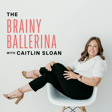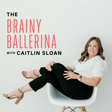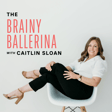
38. Learning to Advocate for Yourself in a Dance Career with Brittney Feit
In this insightful conversation, I speak with Brittney Feit, a former professional dancer with Tulsa Ballet turned nationally certified school psychologist pursuing her Ph.D. Brittney's journey is one of resilience, reinvention, and using her artistry to help others.
We discuss Brittney’s unconventional path in the ballet world, overcoming physical challenges, and navigating interpersonal dynamics as a young dancer cast in principal roles. Brittney opens up about her decision to retire from professional dance due to persistent injuries and how she found fulfillment through education, creative writing, and psychology. She also shares how she now combines her love for movement with her role as a school psychologist, developing neurodiversity-affirming interventions and artistic self-expression programs for her students.
This episode is filled with inspiration, practical advice for dancers facing burnout, and thoughtful perspectives on self-advocacy and mental health in the performing arts.
Key Moments:
- Brittney’s early dance training [1:10]
- Her experience auditioning for companies and signing her first contract with Tulsa Ballet [8:17]
- Brittney’s favorite roles she danced during her pro career [23:12]
- Why Brittney chose to step away from her professional dance career [24:19]
- What led Brittney to study psychology [27:34]
- Brittney’s current work as a school psychologist [36:21]
- Brittney’s biggest mental health struggle during her dance career [41:55]
- How to know if you’re burnt out (and what to do about it within your dance career) [45:42]
- What Brittney believes needs to change in the dance industry [56:37]
- Her biggest piece of advice for dancers pursuing a career [1:02:30]
Connect with Brittney:
INSTAGRAM: instagram.com/brittneyfeit
WEBSITE: www.brittneyfeit.com
YOUTUBE: https://www.youtube.com/@BrittneyFeit
Links and Resources:
Set up ticketing for your next event with DRT (Make sure to mention that The Brainy Ballerina sent you!)
Get your copy of The Intentional Career Handbook
Second Act Mentorship: https://www.secondactnetwork.org/
1-1 Career Mentoring: book your complimentary career call
Let’s connect!
My WEBSITE: thebrainyballerina.com
INSTAGRAM: instagram.com/thebrainyballerina
Questions/comments? Email me at caitlin@thebrainyballerina.com


